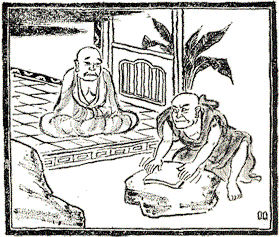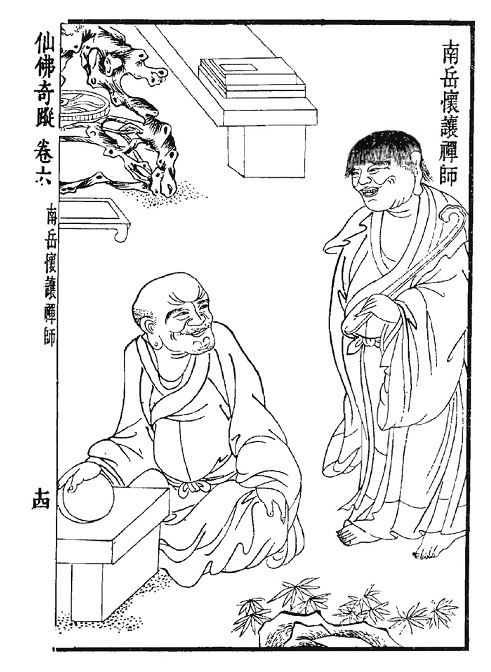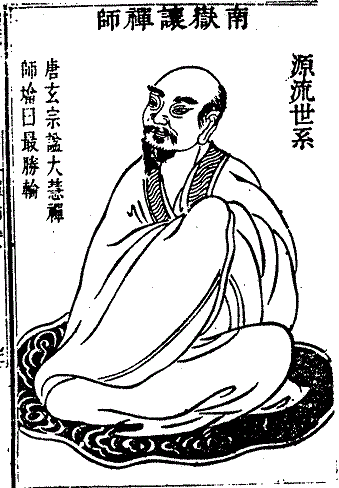ZEN IRODALOM ZEN LITERATURE
« Zen főoldal
« vissza a Terebess Online nyitólapjára

南嶽懷讓 Nanyue Huairang (677-744)
(Rōmaji:) Nangaku Ejō
(Magyar:) Nan-jüe Huaj-zsang
Tartalom |
Contents |
| Nan-jüe Huaj-zsang mondásaiból Fordította: Terebess Gábor |
Huai Jang of Nan Yo Mountain Encounter Dialogues of Nanyue Huairang |
![]()
Nanyue Huairang's Dharma Lineage
[...]
菩提達磨 Bodhidharma, Putidamo (Bodaidaruma ?-532/5)
大祖慧可 Dazu Huike (Taiso Eka 487-593)
鑑智僧璨 Jianzhi Sengcan (Kanchi Sōsan ?-606)
大毉道信 Dayi Daoxin (Daii Dōshin 580-651)
大滿弘忍 Daman Hongren (Daiman Kōnin 601-674)
大鑑慧能 Dajian Huineng (Daikan Enō 638-713)
南嶽懷讓 Nanyue Huairang (Nangaku Ejō 677-744)
The First Generation After the Patriach Hui Neng:
Ch'an Master Huai Jang of Nan Yo Mountain (677-744)
Translated from 古尊宿語錄 Guzunsu yulu [Recorded Sayings of the Ancient Worthies]
by Lu K'uan Yü (Charles Luk)
In: The Transmission of the Mind Outside the Teaching
Rider & Co., London, 1974, pp. 32-37.
CH'AN master Huai Jang of Nan Yo peak was a native of
Chin Chou district (now An K'ang in Shensi province). His
lay surname was Tu and his birth took place on the eighth
day of the fourth month of the second year of Yi Feng reign
(14 May 677).
When he was born the state astrologer saw an auspicious
white vapour in the sky and reported the remarkable sign to
emperor Kao Tsung. The emperor asked him what this portended
and he replied that it augured the birth in the country
of an eminent monk who would disregard worldly fame.
The monarch then ordered prefect Han Chieh to visit and
congratulate the Tu family on the happy occasion.
The Tu family had three sons and the master was the
youngest. At the age of three he differed greatly from other
children and was noted for his kindness and humility. Hence
his father gave him the name of Huai Jang (lit. Harbouring
Humility).
When he was ten years old he was interested only in
reading Buddhist books. One day the Tripitaka-master
Hsuan Ching passed before the house and saw the child. Surprised
by his unusual features, Hsuan Ching said to his parents,
'If your child leaves home he will realize the Supreme
Vehide and will liberate many living beings'.
At 15 he left his parents and went to Yu Ch'uan monastery
at Ching Chou where he joined the Sangha and became a
disciple of Vinaya-master Hung Ching. In the second year
of T'ung T'ien reign (697) he was ordained and began
studying the Vinaya-pitaka.
One day he said with a sigh, 'Leavers of homes aim at
realizing the transcendental (wu wei) Dharma which is unsurpassed
in the worlds of devas and men.' The monks at
the monastery, struck by his high resolution, urged him to
call on Ch'an master Hui An on Sung Shan mountain who
initiated him into the Mind Dharma. He then proceeded to
Ts'ao Ch'i to pay reverence to the Sixth Patriarch Hui Neng.
Asked by the patriarch where he came from, he replied,
'From the monastery of master Hui An at Sung Shan'. The
patriarch asked, 'What thing is it and how does it come?'
The master was speechless, and eight years later one day he
suddenly experienced some spiritual awakening and said to
the patriarch, 'I have experienced some awakening.' The
patriarch asked, 'What is it?' The master replied, 'To say it is
like something misses the mark.' The patriarch asked, 'Can
it still be practised and experienced?' The master replied,
'Although its cultivation and experiencing are not uncalled
for, it cannot be sullied.' The patriarch said, 'Just that which
cannot be sullied is protected and thought of by all Buddhas.
It is so for you and also for me. The Twenty-seventh Indian
Patriarch Prajnatara predicted about you as follows:
Though China is vast there is no other
Path than that trodden by the descendants
Of the Golden Cock who brought in its beak a grain
Of corn to offer to an arhat-monk at Shih Fang.**Golden Cock is Bodhidharma and the grain of corn his Mind Dharma.
His descendants are the Chinese patriarchs and masters, Huai Jang included,
who spread his teaching.
The arhat-monk is Ma Tsu and Shih Fang his place of birth.
and about your successor as follows:
On the bank of the Han river is revealed
The subject that is hidden in the mind.
The ripples on the lake seek out the moon in water
Which will illume only two or three disciples.**Han river at Han Chou, the place of birth of Ma Tsu. Ripples stand
for strivings in search for the moon or enlightenment.
The patriarch continued, 'My predecessor ordered me to
stop transmitting the robe but to hand down the Dharma
only. For if the robe is handed down, the life of its possessor
will hang by a hair. Therefore, spread the Dharma to convert
people'. Now listen to my gatha:
The Mind-ground holds the (flower) seeds
Which sprout when falls the all-pervading rain.
The wisdom-flower of instantaneous awakening
Cannot fail to bear the Bodhi-fruit.
'After you a colt* will rush out, trample on and kill people
all over the world. The answer will be found in your mind
but do not speak of it too soon.'
*A colt or horse is called 'ma' in Chinese; Ma was also the lay surname
of Ma Tsu and Tsu means ancestor or founder (of his school).
The master served the patriarch for fifteen years and in the
second year of Hsien T'ien reign (712) he went to Nan Yo
peak where he stayed at Po Jo monastery. (The gist of) his
instruction ran as follows:
'All things spring from the mind but since the mind creates
nothing, they cannot stay. If you understand the mind you
will be free from all obstructions. Be careful to reveal this
only to those of high spirituality.'
*
A monk asked the master, 'If a (metal) mirror is melted to
make a statue, when the statue is finished, where does the
brightness (of the mirror) go?'
The master replied, 'It islike your former appearance before
you left home to join the order; where has it gone?'
The monk asked, 'When the statue is finished why does it
no longer reflect objects?'
The master replied, 'Although it does not reflect objects,
you cannot abuse it in the least.'*
*The metal mirror stands for the worldly mind which reflects or
responds to objects or sense data, but the statue or pure mind is disengaged
from sense data and does not reflect externals.*
Ma Tsu stayed in Ch'uan Fa temple at Nan Yo where he
had a hut to live in seclusion and practise meditation. He did
not look at those calling on him. One day, Huai Jang came
to see him but Ma Tsu paid no attention to the visitor. Seeing
the unusual expression of Ma Tsu's face, Huai Jang remembered
the Sixth Patriarch's prediction and tried his best to
convert Ma Tsu (to the Mind Dharma).

Huai Jang then took a brick to the door of the hut and
rubbed the brick, but Ma Tsu also paid no attention. After a
long while, Ma Tsu asked, 'What are you doing?' Huai Jang
replied, 'I am rubbing a brick to make a mirror.' Ma Tsu
said, 'How can you make a mirror by rubbing a brick?' The
master said, 'If a mirror cannot be made by rubbing a brick,
how can one become a Buddha by sitting in meditation?'
Ma Tsu then rose from his seat and asked the master,
'What should one do then?'
The master said, 'If a cart drawn by an ox does not move,
is it correct to whip the ox or the cart?' He further asked, 'Do
you want to sit in meditation or to be a sitting Buddha? If
you want to sit in meditation, meditation is neither sitting nor
lying. If you want to be a sitting Buddha, Buddha is not
motionlessness; moreover (even its opposite), motion should
be neither accepted nor rejected. If you sit (to become a)
Buddha, you will simply kill him. If you cling to sitting you
will never realize the Dharma.'
Upon hearing these words Ma Tsu awakened (to the
teaching), bowed down and asked Huai Jang, 'How should
I use my mind to agree with the samadhi beyond form?'
The master replied, 'Your study of the Mind Dharma is
like sowing seeds and my expounding of its essentialsis like
the rain. Since your potentiality agrees with the Dharma,
you should perceive the truth.'
Ma Tsu asked, 'Truth is formless, how can it be perceived?'
The master replied, 'The mind Eye can perceive the truth.
This also applies to formless samadhi.'
Ma Tsu asked, 'Is the truth subject to creation and destruction?'
The 'master replied, 'If the truth is perceived as subject to
creation and destruction, formation and decay, it is not real.
Now listen to my gatha:
The Mind-ground holds the (flower) seeds
Which sprout when moistened by the rain.
The blossom of sarnadhi is formless,
How can it decay or come into being?
Upon hearing these words Ma Tsu awakened to the Mind
Dharma. He stayed to serve the master for ten years during
which he gradually acquired deeper experiences of the Mind
Dharma.
Huai Jang had six disciples whose achievements were sealed
by him personally. He said to them, 'Each of you has acquired
a special part of my body: one who has won my eyebrows
excels in respect-inspiring deportment[1]; one who has won
my eyes excels in seeing[2]; one who has won my ears excels
in hearing the Dharma[3]: one who has won my nose excels
in regulating the breath[4]; one who has won my tongue
excels in preaching[5] and one who has won my mind excels
in the Tao (truth).[6]
[1] Chang Hao of Nan Yo peak.
[2] Chih Ta.
[3] T'an Jan.
[4] Shen Chao of Ch'ao Chou district.
[5] Yen Chun of Ta Ming monastery at Yang Chou.
[6] Tao I, also called Ma Tsu of Chiang Hsi (Kiangsi province).
Later Ma Tsu went to K'ai Yuan monastery in Chiang Hsi
(Kiangsi) province where he spread the Mind Dharma.
*
One day Huai Jang asked his disciples, 'Does Ma Tsu expound
the Dharma to his community?' As his disciples replied in the
affirmative he said, 'I have received no news about it.' He then
sent a monk to Ma Tsu after telling him, 'Wait until after
Ma Tsu has ascended to the Ch'an hall and ask him this
question, "What is it?" Report what he says.'
The monk carried out Huai Jang's instruction and then
returned to tell him, 'Ma Tsu said, "For thirty years after my
last restless confusion I have been short of neither salt nor
sauce'."*
*Vegetarian food is palatable only ifit is prepared with salt and sauce.
Likewise life is worthless if one fails to realize the mind for the perception
of self-nature and attainment of Buddhahood.
The master praised Ma Tsu's understanding.
On the eleventh day of the eighth month of the third year
of T'ien Pao's Reign (21 July 744) Huai Jang passed away at
Nan Yo. The emperor conferred upon him the posthumous
title of 'Ch'an master Ta Hui (Great Wisdom)' and on his
stupa the epithet 'Unsurpassed Wheel' and ordered the vice-
president of the Board of Civil Office to compile the master's
biography for an inscription on the stupa.

Encounter Dialogues of Nanyue Huairang
compiled by Satyavayu of Touching Earth Sangha
DOC: Treasury of the Forest of Ancestors
Master Huairang of Nanyue first left home at the age of fifteen to become a novice. He later received full ordination at Jade Spring Monastery in Jingzhou (Hubei). Huairang stayed on for some time at this prominent monastic center, which was famous for the study of religious discipline (vinaya) and the philosophy of the Tiantai School. At this time Zen practice was also being taught there by Master Shenxiu, one of the most well-known disciples of Master Hongren of the East Mountain School. Not satisfied with the teaching he found there, Huairang heard about the aging Master Hui'an, an older colleague of Shenxiu, and he traveled to Mt. Song to study with him. In this new community Huairang's practice began to mature, but after some time he grew interested in checking out other teachers. Learning about Master Huineng, perhaps from Master Hui'an himself, Huairang decided to travel south and investigate the teaching and community at Caoxi.
When Huairang first arrived, Master Huineng asked, “Where did you come from?”
Huairang said, “From Mt. Song.”
The master asked, “What is it that has come?”
Huairang was stuck and couldn't answer. He then decided to stay and practice there.
Eight years later Huairang one day said to Master Huineng, “Now I have an understanding.”
The master asked, “What is it?”
Huairang said, “To say or do anything misses the mark.”
The master asked further, “Then is there any real practice to do, or awakening to experience?”
Huairang said, “It's not that there isn't practice and awakening, it's just that they can't be defiled.”
The master said, “Just this that can't be defiled is what is upheld and sustained by all the awakened ones. You are like this, I am like this, all the ancestors in India were like this.”
After serving Master Huineng for several more years, Huairang traveled northwest and settled on South Peak (Nanyue) in the sacred Heng Mountain region of Hunan. Many spiritual practitioners, both Daoist and Buddhist, had long gathered in these hills and built their huts and temples. Here Huairang became the master of Nanyue Monastery, and on this mountain he would meet both of the monks who would later become the two most influential masters in the development and spreading of the Zen tradition in Tang Dynasty China. To one, Mazu Daoyi, he would become an important teacher, and to the other, Shitou Xiqian, he was most likely at least a supporter and friend.
Nearby Master Nanyue Huairang's temple on South Peak, the young monk Daoyi had built a hermitage and was gaining a reputation as a diligent meditation practitioner. Master Nanyue went to visit him to examine his understanding, and found him sitting outside near his hermitage. The master asked him, “What does your worthiness intend to accomplish by sitting in meditation?”
Daoyi said, “I intend to become an awakened one.”
The master then picked up a piece of ceramic roofing tile from the ground and began grinding it on a rock.
Daoyi asked, “What are you doing?”
The master said, “I'm polishing this tile to make a mirror.”
Daoyi asked, “How are you going to make a mirror by polishing a tile on a rock?”
The master said, “How are you going to make an awakened one by sitting in meditation?”
Daoyi was taken aback. After a pause he asked, “What is the correct way?”
The master said, “Think about driving an ox-cart. When it stops moving do you whip the cart or the ox?”
Daoyi didn't answer.
Then Master Nanyue said, “Is your sitting an attempt to practice Zen, or to be an awakened one? If you really understand what Zen-sitting is, you'd know that Zen is not about sitting or lying down. If you want to know the sitting of an awakened one, then you must understand that awakening has no fixed form. In this ephemeral, changing world, you should give up both grasping and rejecting. If you sit in order to become awakened, you destroy awakening. If you're attached to the form of sitting, then you haven't yet reached the essential understanding.
When Daoyi heard this, he felt like he had drunk sweet nectar.
Dogen said:
Polishing a tile to make a mirror is diligent effort.
and
Polishing a tile to make a mirror is our reward for accumulating merit and virtue.
He also said:
Instead of hitting the ox, you should hit the cart.
and
When one cart is hit, many carts go quickly.
Once a monk asked Master Nanyue, “If a bronze mirror is melted down and cast into an image, where does the bright reflection go?”
The master said, “Venerable, your face when you were a child and hadn't yet left home – where has it gone?”
The monk said nothing. Then after a pause he asked, “After the image is completed, how come it doesn't reflect and illuminate any more?”
The master said, “Although it doesn't appear to reflect and illuminate, it's not deceiving you.”

Nan-jüe Huaj-zsang mondásaiból
Fordította: Terebess Gábor
A Kőrösi Csoma Sándor Intézet Közleményei, 1976. 1-2. szám, 79. oldal
Folyik a híd, Officina Nova, Budapest, 1990, 18. oldal
Ma-cu remetekunyhójában élt a Heng-hegyen, és éjt-nap belemerült az elmélkedésbe. Fel se nézett, amikor Huaj-zsang mester meglátogatta.
– Miért elmélkedsz? – kérdezte a mester.
– Hogy Buddha legyek – felelte Ma-cu.
Huaj-zsang felvett egy téglát, s az ajtó előtt csiszolni kezdte egy kövön.
– Mit csinálsz?
– Tükröt csiszolok.
– Hiába csiszolod, attól nem lesz tükör a tégla!
– Hiába elmélkedsz, attól nem leszel Buddha! – vágott vissza Huaj-zsang.
– Akkor mit tegyek?
– Ha nem indul el az ökrös szekér, az ökörre kell suhintani vagy a szekérre?